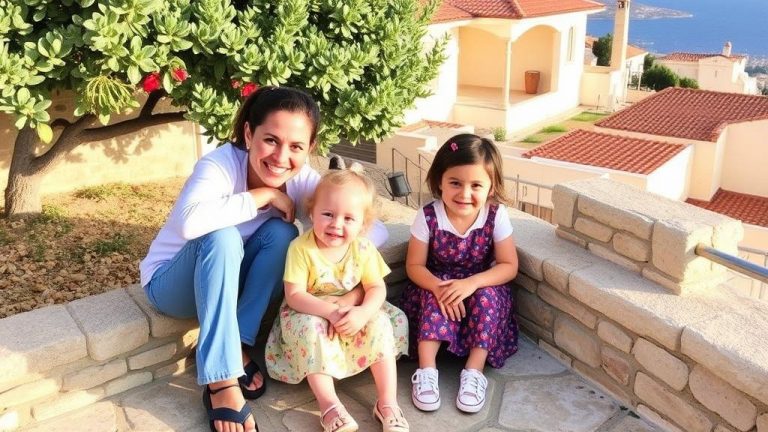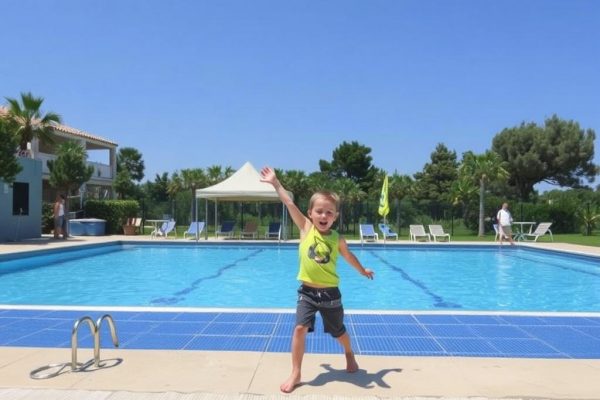Parenting in Cyprus presents a unique blend of ancient tradition and modern lifestyle, shaped by the island’s Mediterranean environment and rich cultural heritage. The approach to raising children Cyprus is deeply rooted in family values, community bonds, and a warm climate that encourages outdoor activities and social interaction. Understanding this context is critical to grasping the distinctiveness of child development Cyprus, as the island’s parenting framework delicately balances respect for tradition with contemporary educational and emotional needs. This article explores the multiple facets of parenting in Cyprus—examining cultural norms, family dynamics, education practices, social influences, and practical parenting resources available to families.
Cultural Foundations of Parenting in Cyprus
Parenting values in Cyprus are heavily influenced by Greek Orthodox traditions and Mediterranean lifestyles. Families tend to operate on multi-generational principles, where grandparents, parents, and children coexist in close-knit setups either within the same household or in nearby homes. This structure supports a collective approach to raising children Cyprus, with strong involvement from extended family members in day-to-day child care and upbringing.
The family is regarded as the cornerstone of society, and parents often emphasize respect, obedience, and communal responsibility in child-rearing. Discipline tends to be strict yet affectionate, with an emphasis on teaching children the importance of social harmony and family pride. This creates a stable environment for child development Cyprus by blending warmth with clear boundaries.
In Cyprus, parenting is less about isolation and more about nurturing within a network of extended family, strengthening children’s sense of belonging from an early age.
The Mediterranean climate also plays a significant role in the rhythms of family life. Long, sunny days encourage outdoor play and community engagement, allowing children to interact freely with peers in diverse settings. This natural exposure supports physical development, creativity, and social skills, which are vital elements of raising children Cyprus.
The Role of Family Activities Cyprus in Child Development
Family activities Cyprus are central to bonding and nurturing a child’s emotional and social growth. Traditional events such as everyday meals, religious festivals, and seasonal celebrations offer children opportunities to develop a strong cultural identity alongside their personal growth. Outdoor pursuits like beach outings, hiking in the Troodos Mountains, or simply playing in local neighbourhoods are not only recreational but fundamentally educational in terms of cooperation and resilience.
Engagement in these activities also reinforces important life skills. For example, participating in cooking family recipes teaches patience, responsibility, and cultural appreciation. Similarly, communal festivities instill a sense of community, strengthening children’s psychological well-being and resilience.
Regular family activities in Cyprus foster holistic child development by blending fun, learning, and cultural immersion.
Parents here often encourage active lifestyles, recognizing the numerous benefits of physical exercise on mental health and academic performance. With accessible natural settings around every corner, families frequently engage in walking, cycling, and sports, ensuring that children develop robust health habits early on.
Education and Its Influence on Parenting Practices
Education plays a pivotal role in shaping parenting in Cyprus today. Parents prioritize formal education while simultaneously valuing informal learning through family and community interaction. The Cypriot educational system includes both public and private options, with multilingual instruction increasingly emphasized, reflecting the island’s geographic and cultural crossroads.
Raising children Cyprus thus involves a dual focus: encouraging academic excellence and nurturing emotional intelligence and social skills. Most parents actively collaborate with schools, attending meetings and participating in school events, reflecting a strong partnership for child development Cyprus.
| Aspect | Parenting Approach | Impact on Child Development |
|---|---|---|
| Academic Emphasis | Strong commitment to school, homework, and additional tutoring | Encourages discipline, cognitive skills, and future career readiness |
| Emotional Support | Open communication, recognition of feelings, family counseling | Fosters emotional resilience and interpersonal skills |
| Community Involvement | Participation in cultural and religious events | Helps develop social identity and collective responsibility |
The integration of traditional values with modern education makes parenting in Cyprus a dynamic process. For example, while academic success is strongly pursued, children are also encouraged to engage in arts and sports, promoting a balanced development rather than a narrow focus on grades.
Challenges Faced by Modern Parents in Cyprus
Despite the supportive cultural environment, raising children Cyprus is not without its challenges. Urbanization and the fast pace of modern life exert pressure on family structures. Younger parents navigate the competing demands of career, childcare, and personal wellbeing, often with limited external support beyond the extended family circle.
Another significant issue is the pressure placed on children for academic achievement. This sometimes leads to anxiety and stress among youngsters, requiring parents to find strategies for emotional balance. Additionally, technology and social media’s influence present new parenting challenges, demanding vigilance to foster healthy screen habits and safeguard mental health.
Modern parenting in Cyprus requires balancing traditional values with the realities of a changing sociocultural landscape.
Furthermore, the need for accessible parenting resources has grown. While Cyprus offers various support avenues, such as community centers and educational workshops, awareness and availability can vary widely by region. This variability means some parents face barriers in accessing professional advice or developmental services for their children.
Parenting Resources Available in Cyprus
To support parents in their role, Cyprus offers a growing array of parenting resources designed to enhance child development Cyprus through informed guidance and practical support. These include health services, family counseling, educational workshops, and community programs.
The Ministry of Education and Culture, along with local municipalities, consistently promote initiatives aimed at empowering parents. For instance, parent-teacher associations play a vital role in community dialogue and advocacy, facilitating resource sharing and collaborative problem solving.
Private organizations and NGOs also contribute significantly by offering parenting courses, speech therapy, and psychological support tailored to contemporary family needs. Digital platforms targeting parenting in Cyprus are increasingly popular, providing accessible advice on nutrition, child psychology, and legal rights.
- Government-sponsored early childhood development programs
- Community centers offering family counseling and support groups
- Private therapy and educational services specializing in child development
- Online portals and mobile applications delivering parenting tips and tools
- Religious institutions facilitating moral and communal guidance for families
These resources allow parents to better navigate challenges, access expert knowledge, and connect with other families. As a result, parenting in Cyprus continues to evolve, supported both by tradition and a modern infrastructure focused on well-being.
Integrating Traditional and Contemporary Parenting Styles
One of the most defining features of parenting in Cyprus is the fluid integration between longstanding Mediterranean values and contemporary psychological insights. Parents often rely on a mix of authoritative and permissive styles, adjusting their approach according to the child’s temperament, environment, and developmental stage.
This blending leads to a parenting style that supports autonomy while maintaining high expectations for behavior and achievement. Respect and emotional warmth exist side by side with firm guidance. Many parents deliberately foster creativity and independence by encouraging exploration and self-expression within the safety of family bonds.
The dialogue between generations also enriches the process; grandparents pass down cultural knowledge, while younger parents introduce new educational practices and openness around mental health topics.
The evolving parenting landscape in Cyprus balances respect for tradition with acceptance of new scientific and social understandings of child development.
Community and Social Support Networks in Raising Children Cyprus
Community networks are indispensable in raising children Cyprus. Neighbourhoods often function as extended families, where parents look out for each other’s children and share advice and childcare responsibilities. Schools, religious centers, and local clubs regularly organize events that foster community cohesion and child participation.
Support from friends and neighbours reduces isolation, especially in the urbanized context, and creates a resilient social fabric. These interactions allow parents to model social behavior and expose children to diverse viewpoints and experiences, contributing to well-rounded development.
Participation in community life is viewed not only as beneficial but essential in family life. Cypriot culture values generosity, hospitality, and collective celebration—all of which occur prominently in social settings involving children.
Nutrition and Health Practices in Parenting
The Mediterranean diet significantly influences nutrition in parenting in Cyprus, promoting healthy eating habits from an early age. Fresh fruits, vegetables, olive oil, legumes, and fish constitute the staple diet that children grow up with, supporting physical development and well-being.
Parents emphasize regular family meals which serve dual functions: ensuring nutritional balance and providing consistent opportunities for communication and family connection. Pediatricians and health educators in Cyprus actively promote vaccination, developmental screenings, and preventive care as cornerstones of child development Cyprus.
Outdoor lifestyle inherently supports good health standards, as children spend substantial time playing and exercising in natural environments. This routine, combined with balanced nutrition, helps prevent common childhood ailments and fosters robust growth.
Emotional Wellbeing and Early Childhood Development
Emotional wellbeing is a critical component of child development Cyprus, increasingly recognized by parenting programs and medical professionals. Caregivers are encouraged to create nurturing environments where children feel safe expressing emotions and exploring their identities.
Early childhood development centers in Cyprus often include social-emotional learning as part of their curriculum. This approach strengthens children’s abilities to manage stress, build empathy, and develop positive relationships. Parenting in Cyprus reflects these priorities through attentive caregiving that respects the child’s psychological needs alongside physical safety.
Investing in emotional wellbeing is central to raising happy, confident children capable of thriving in Cyprus’s changing social environment.
Future Directions for Parenting in Cyprus
Looking ahead, parenting in Cyprus will continue to evolve as new social, economic, and technological challenges emerge. Increased urbanization and global influences call for adaptable strategies that maintain core cultural values while embracing innovation in child development Cyprus.
Investments in parenting resources, including digital tools, mental health services, and community outreach, will play a crucial role. Educational reforms aimed at comprehensive child development, encompassing cognitive, emotional, and physical domains, are expected to deepen parental involvement and expertise.
Moreover, efforts to support working parents through flexible policies and childcare options will directly impact family wellbeing. Strengthening community networks remains essential, ensuring families do not face isolation amid modern complexities.
Parenting in Cyprus is set to balance tradition and modernity, fostering the next generation’s happiness and success in a Mediterranean cultural setting.
Raising Cypriot Children Ready for the World: A Final Reflection
Raising children Cyprus means nurturing them in an environment steeped in tradition yet open to transformation. It requires balancing historic Mediterranean values like family cohesion, respect, and community support with modern emphasis on education, emotional health, and personal growth. Parenting in Cyprus is dynamic—anchored by close family ties and enriched by the island’s beauty, culture, and evolving resources.
Children grow in a network that integrates outdoor play, cultural participation, and academic aspiration, ensuring they develop into confident, resilient individuals. For parents, it is both a privilege and a responsibility to contribute to this ongoing legacy, guiding their children with wisdom, love, and pragmatic support. With expanding parenting resources and community involvement, Cyprus’ families are well-positioned to meet the challenges of an increasingly complex world while preserving the warmth and strength of Mediterranean culture.
By embracing a holistic and adaptive parenting approach, caregivers in Cyprus can truly raise happy children who value their roots and are prepared to thrive globally.
Frequently Asked Questions about Parenting in Cyprus
- What are the main cultural influences on parenting in Cyprus?
Parenting in Cyprus is heavily influenced by Greek Orthodox traditions and Mediterranean family values, emphasizing respect, family cohesion, and community involvement. - How important are family activities in raising children Cyprus?
Family activities are vital for bonding and social development, combining cultural celebrations, outdoor play, and shared meals to foster emotional growth. - What role does education play in parenting in Cyprus?
Education is highly prioritized, with parents balancing academic achievement with emotional support and community involvement to ensure balanced development. - Are there parenting resources available for Cypriot families?
Yes, resources include government programs, community centers, private counseling, and digital platforms offering guidance on child development and family wellbeing. - What challenges do modern parents face in Cyprus?
Challenges include balancing work and family life, academic pressure on children, technology management, and variable access to support services. - How is emotional wellbeing addressed in child development Cyprus?
Parents and educators emphasize safe environments for emotional expression and social-emotional learning initiatives to promote resilience and confidence. - How does the Mediterranean diet impact parenting in Cyprus?
The Mediterranean diet, rich in fresh produce and healthy fats, forms the foundation of children’s nutrition, promoting physical health and instilling good eating habits early on.





